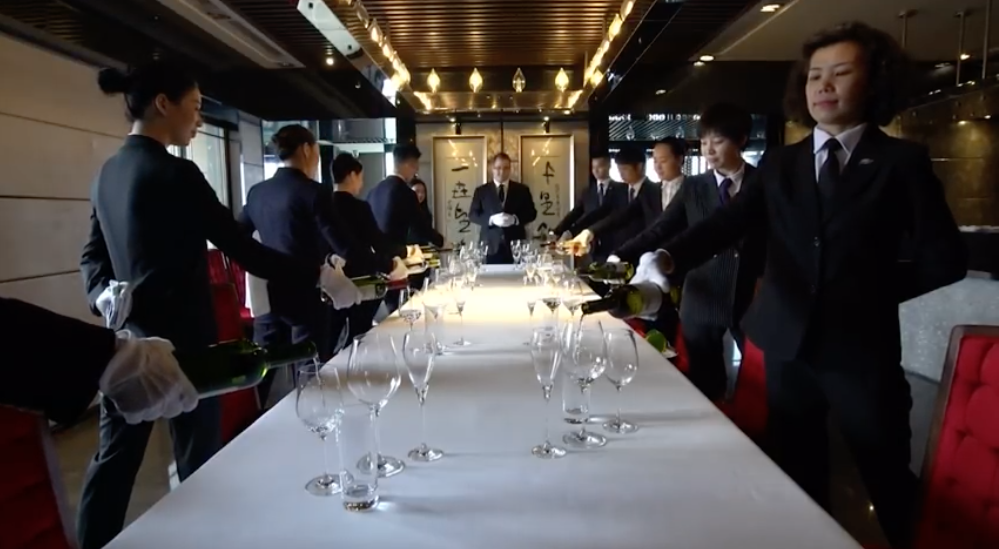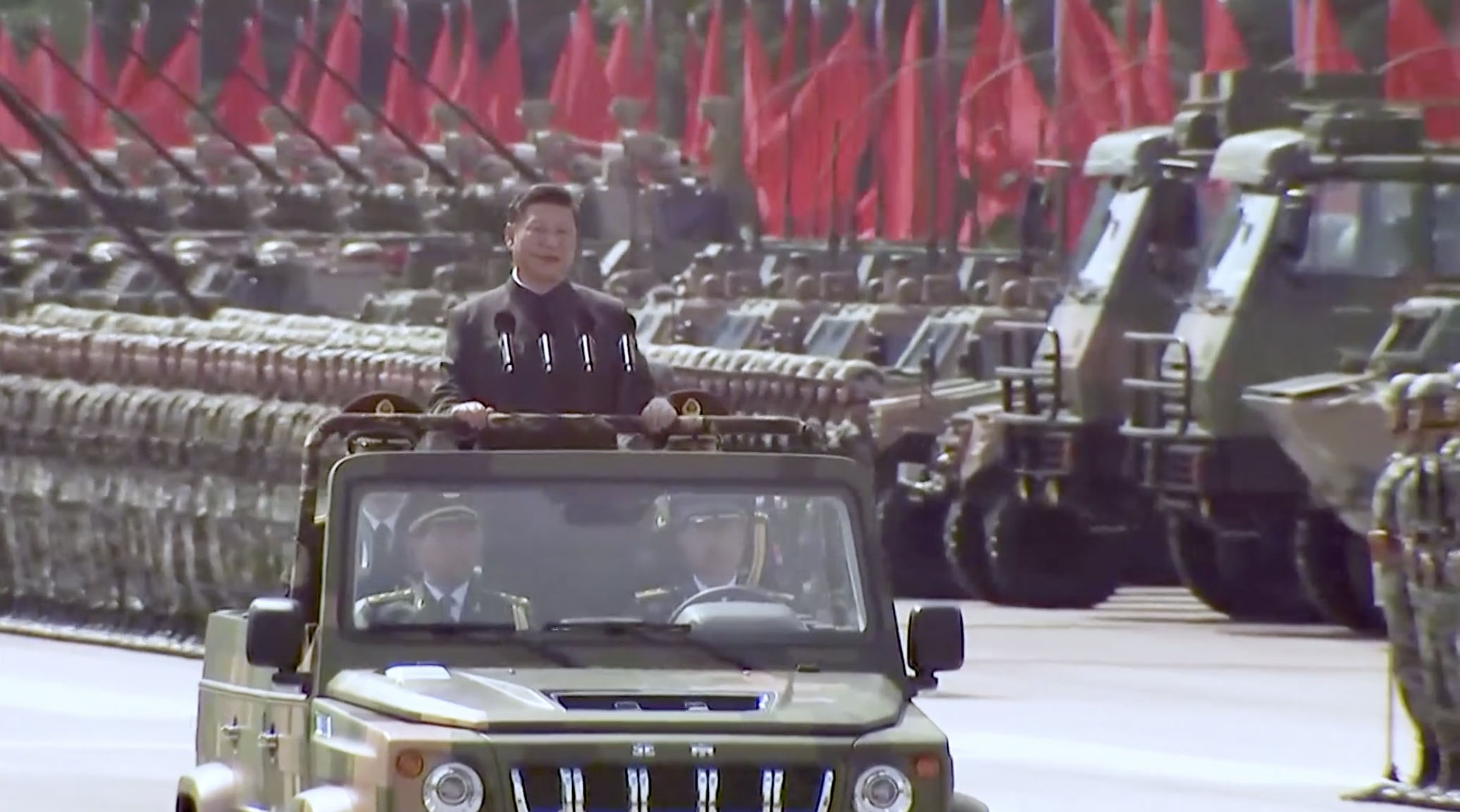
Special correspondent Katrina Yu reports on the fourth in a 10-part series, "China: Power and Prosperity," with support from the Pulitzer Center.
Hari Sreenivasan:
For most of the last century, getting rich in China was against the rules. The communist government's planned economy saw to that.
But things changed in the 1980s, when then-leader Deng Xiaoping's rallying cry was "to get rich, is glorious."
Today, President Xi Jinping's anti-corruption campaign has resulted in a crackdown on ostentatious displays of wealth. It comes with one clear message: a life of luxury must come second to communist party loyalty. All this as China produces billionaires faster than any country in the world.
With support from the Pulitzer Center, we continue our series "China, Power & Prosperity" with NewsHour Special Correspondent Katrina Yu reporting from Beijing.
Katrina Yu:
Their pacing is precise, their spacing is seamless, and their pours are perfect. This is China's first butler academy and they're practicing the exact vintage pour. Their six-week course includes centuries-old traditions. But these students aren't being trained to serve old wealth. Their future employers will be members of China's new rich. In Communist China, millionaires are being minted faster than anywhere else. They're filling harbours with multi-million dollar yachts. Watching laser light shows at $3,000 a night hotels and buying luxuries. Sara Jane Ho knows all about the possibilities and pressures of being wealthy in China.
Sara Jane Ho:
"Average price here is probably $1,000 US, not too expensive at all."
Katrina Yu:
The 34 year-old has been called China's 'Millennial Martha Stewart' and founded the country's first finishing school. Many of her students are second-generation rich, born in the 80s and 90s and born into millions.
Sara Jane Ho:
In no other country other than China have you had such a great amount of change in such a short amount of time. And now they have so much money that the last thing they want to do is see their kids go through any kind of hardship. For the kids, a lot of it is about individuality. They want to spend on something that other people don't have.
Katrina Yu:
Sara Jane is an expert on where to shop, what to wear, and where to be seen. At an up-market Italian restaurant in downtown Shanghai, Sara Jane shares her Michelin-starred meal with her social media followers.
Katrina Yu:
Lunch costs about $400. That's the equivalent of a monthly middle-income salary.
Sara Jane Ho:
When you make so much money in such a short amount of time, it actually places a lot of pressure on an individual. There's no old money in China because of historical reasons. A lot of people were very poor, I mean everybody was very poor, up until the 90s.
Katrina Yu:
Accumulating wealth in Communist China was once considered counter-revolutionary. Mao Zedong came to power in 1949 vowing to eliminate class and abolish capitalism. Affluent families lost their wealth and many lost their lives as Mao pursued his utopian vision of communism. That vision resulted in the deaths of tens of millions from famine, and left almost 90 percent of the population living in extreme poverty. That all changed in the 1980s, when leader Deng Xiaoping loosened state control over China's economy and permitted private enterprise, reforms which would turn the country into the world's second largest economy. Forty years later, Chinese cities have become shopping meccas catering to China's rapidly expanding middle-class, and upper class. Chinese consumers make up a third of the $1.3 trillion dollar global luxury market. And luxury spending is expected to grow by over 10 percent this year.
Tao Laing:
"Hi I'm Mr Bags, welcome to my show."
Katrina Yu:
It's a trend Tao Liang has in the bag. The 26 year-old is known as "Mr. Bags," an entrepreneur and one of the country's top online influencers. He has millions of loyal fans who hang on his every recommendation. During an online campaign last year, his company sold half a million dollars worth of bags in just six minutes.
Tao Liang:
Definitely some Chinese girls buy bags because they want big brands, they want people to know they're rich, they want people to know they're tasteful. But nowadays, I think a lot of Chinese women when they buy bags, they really buy bags because they want to pursue happiness.
Katrina Yu:
International brands are working hard to contribute to the happiness and handbag collections of Chinese consumers. But they don't always get it right. Last November, Dolce and Gabbana stoked fury after releasing this advertising campaign in China.
Campaign:
"It's way too big for you, isn't it?"
Katrina Yu:
Chinese social media users accused the brand of reinforcing racist stereotypes. Consumer backlash resulted in Dolce and Gabbana being banned from major Chinese online retailers. Last month, Versace, Givenchy and Coach issued apologies after printing t-shirts describing Hong Kong and Taiwan as separate from China. Fall outs with foreign fashion labels have demonstrated the power of China's increasingly wealthy population. But being wealthy in China has its limits. When it comes to the Chinese government, being too rich can be risky. Chinese President Xi Jinping has launched an anti-corruption campaign and overseen investigations into the country's wealthiest and most powerful. More than 100,000 have been jailed for embezzlement and bribery, others fired for throwing lavish parties and indulging in expensive liquor. Ostentatious wealth is regularly denounced on state media and primetime TV. The hit television show 'Father, Where Are We Going?,' Was cancelled because of its portrayal of spoiled second generation rich children. Commentator and academic Zhu Dake says it's in the government's interest to reign in 'crazy rich' behavior.
Zhu Dake:
The Chinese government knows that if rich people show off their wealth too much, it will deepen the impression of the social polarization by ordinary people. The Chinese government requires rich people to be low-key, and poor people to be contented with their life. Then the country would be stable.
Katrina Yu:
China's ultra-wealthy must closely align themselves with the government. Jack Ma, a tech tycoon with an estimated $40 billion fortune, is a member of the communist party. Movie star Jackie Chan routinely defends Beijing, and attacks international critics. Last month, the Hong Kong resident described pro-democracy protests in the city as "sad and depressing," and called himself a protector of the Chinese flag.
Zhu Dake:
You must firstly be on the same side as the government, so the government can feel they made you successful. All of the successful people should stand on the same side with the government. If you do not support them, they will make you unsuccessful.
Katrina Yu:
The government has vowed to eradicate poverty by 2020, saying it's lifted 83 million rural poor out of poverty over the last six years. But according to the World Bank, many more remain behind. 40 percent of the country's population, 500 million people, continue to live on less than $5.50 a day. And while some struggle to put a roof over their head, others build roofs, for their dogs. Zhou Tianxiao spent half a million dollars on a pet paradise for his border collie Sylar. Complete with a training gym, a dog-themed party space and an indoor doggie pool. Zhao Tianxiao grew his fortune selling pet products online. He showed us a wall decorated with photos of his best friend who he credits with lifting him out of depression.
Zhou Tianxiao:
It's like raising a child. I have deep affection for my dog, I rarely take photos of myself. When someone asks me, how should I introduce you, I say 'call me Sylar's dad.' He's integrated into every part of my life.
Katrina Yu:
In China, the richest one percent own a third of the country's wealth. Zhou says he's bombarded online by critics who question his choice to splurge on a dog while millions must fight to survive. But the only opinion he cares about is Sylar's.
Zhou Tianxiao:
He never cares about who you are or your social status. People think I'm some silver-spoon kid wasting my parent's money by giving my dog a life of luxury. That's not true. I've worked hard and experienced challenges.
Katrina Yu:
And as the gap between China's rich and poor continues to grow, Zhou refuses to apologize for his lifestyle.
Zhou Tianxiao:
It's normal to be criticized, I don't care. Part of the money you earn pays for the criticism you bear. My mind is at peace.
Katrina Yu:
In China, it seems there's very little money can't buy. For the PBS NewsHour, I'm Katrina Yu, in Beijing.





